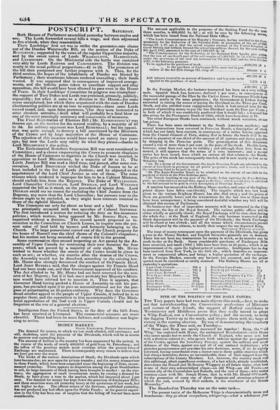POSTSCRIPT • SATURDAY.
Both Houses of Parliament assembled yesterday between twelve and (me. The Lords forwarded several bills a stage, and then adjourned to five o'clock, when they reassembled.
Their Lordships' first act was to strike the guarantee-rate clause out of the Dundee Waterworks Bill, on the motion of the Duke of BUCCLEUCH ; supported by the votes of the regular Opposition majority, and by the sweet voices of Lords WHARNCEIFFE, HADDINGTON, and LYNDHURST. On the Ministerial side the battle was sustained very ably by Lords RADNOR and Cast PERDOWN. The division was nearly in the usual political proportions-42 to 24. The promoters of the bill then postponed any further progress with it. Thus, for the third session, the hopes of the inhabitants of Dundee are blasted by Parliament ; their wearisome labours rendered unavailing ; their funds wasted. It was supposed that in consequence of improved arrange- ments, and the infinite pains taken to conciliate support and allay opposition, this bill would have been allowed to pass even in the House of Peers. In their Lordships' Committee its progress was triumphant the support of Tory Dukes and Lords was promised, privately, publicly, repeatedly ; but when it came to a division in the House—for some cause unexplained, but which those acquainted with the state of Dundee electioneering politics are at no loss to conjecture—these same Lords turned round, and, upon false pretences, 7(for they were instructed to utter absolute untruths,) dealt what will probably be a fatal blow on one of the most pressingly necessary and conservative of measures. The Final Regictration of Electors Bill (Mr. ELPHINSTONE'S) was thrown out, on the motion for the second reading, by a majority of 67 to 34. Its solitary opponent was Lord REDESDALE ; but his opposi. tion was quite enough to destroy a bill sanctioned by the Ministers of the Crown and by large majorities of the House of Commons. The rejection of this measure would have raised an outcry two years ago; but now the Lords may safely do what they please—thanks to Lord MELBOURNE'S fine policy. The Ecclesiastical Benefices Suspension Bill was next considered in Committee ; and a clause empowering the Crown to promote chaplains of the House of Commons to dignities in the Church was inserted, in opposition to Lord MELBOURNE, by a majority of 30 to 11. The Lords Justices Bill was read a third time, and passed, after some con- versation. Lord BROUGHAM wished the Duke of Sussex to be at least included in the list of Lords Justices ; and he objected to the appointment of the Lord Chief Justice as one of them. The same reasons which rendered it improper for him to be a Cabinet Minister, should exclude him from the Regency. The Duke of WELLINGTON, Lord Chancellor COTTENHAM, Lord DENMAN, and Lord WyNeonn supported the bill as it stood, on the precedent of Queen Ann. Lord DENMAI.1 could see no reason for excluding the Chief Justice from the Regency, any more than the Lord Chancellor; but persons near to the throne ought to be excluded, as they might have interests inimical to those of the rightful Monarch.
The Commons sat only for about an hour and a half. Their time was principally occupied with two speeches of Colonel SIBTHORP. The first introduced a motion for reducing the duty on fire-insurance policies ; which motion, being opposed by Mr. SPRING RICE, was negatived without a division. The second speech proposed an in- struction to the Committee on Church Leases, to inquire into the pre- sent value of land held by laymen and formerly belonging to the Church. The large possessions carved out of the Church property for the house of Russell was the chief theme of the Colonel's eloquence; but his motion not being seconded, of course fell to the ground.
Some conversation then ensued respecting an Act passed by the As- sembly of Upper Canada for continuing their own duration for four years; which act passed by a majority of only eight. Mr. Hum wished to know whether the assent of the Crown would be given to such an act ; or whether, six months after the demise of the Crown, the Assembly would not be dissolved, according to the existing law. Mr. Hume also strongly denounced the conduct of SirFrancis Head. Lord Jolts; RUSSELL said, that the charges against Sir Francis Head bad not been made out, and that Government approved of his conduct. The Act alluded to by Mr. Hume bad not been reserved for the con- sent of her Majesty ; but if it had, most probably her Majesty's Minis- ters would have advised her to sanction it. 'Thus it appears, that Governor Head having packed a House of Assembly to suit his pur-
pose, has prevailed upon it to pass an unconstitutional act for the pur-
pose of perpetuating an ill-gotten authority. Why does the Governor dread another appeal to the people of Upper Canada, it' indeed he is so popular there, and the opposition to him so contemptible ? The Minis- terial approbation of the foul work in Upper Canada Ehould not be forgotten at the eve of a general election.


























 Previous page
Previous page